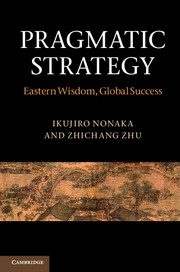Book contents
- Frontmatter
- Contents
- Figures
- Tables
- Cited classics
- Preface
- Part I Why pragmatism, why now?
- Part II What do pragmatic strategies look like?
- Part III What to do, how to do it?
- 5 Dealing with wuli–shili–renli
- 6 Timely balanced way-making
- 7 Orchestrating WSR, orchestrating the firm
- Part IV Think when we learn
- Notes
- References
- Index
5 - Dealing with wuli–shili–renli
Published online by Cambridge University Press: 05 June 2012
- Frontmatter
- Contents
- Figures
- Tables
- Cited classics
- Preface
- Part I Why pragmatism, why now?
- Part II What do pragmatic strategies look like?
- Part III What to do, how to do it?
- 5 Dealing with wuli–shili–renli
- 6 Timely balanced way-making
- 7 Orchestrating WSR, orchestrating the firm
- Part IV Think when we learn
- Notes
- References
- Index
Summary
In previous chapters we questioned the conventional wisdom, called for a pragmatic turn, presented the spirits of pragmatism and investigated what pragmatic strategies look like. Based on this groundwork, we now invite readers to explore the normative question: what to do, how to do it?
We begin with front-line experience: how managers think and act strategically to turn companies around. We then link the experiences of managers with enduring Confucian wisdom. From this we construct a triple-strategy bottom line (WSR): wuli (物理), the material-technical; shili (事理), the cognitive-mental; and renli (人理), the social-relational. Pragmatic strategies based on WSR generate value efficiently, creatively and legitimately by getting fundamentals right, envisioning a valued future and realising common goodness. We illustrate wuli, shili and renli with business cases: Grameen Bank, Northern Rock, China Merchants Bank, Xerox, Airbus, Seven-Eleven Japan, Komatsu, Huawei, Lenovo, Polaroid, Swatch and many more. This relational WSR bottom line, addressing the question what to do, will be complemented in the next chapter with a temporal timely balance guidance on how to do it. Now, let our journey continue.
- Type
- Chapter
- Information
- Pragmatic StrategyEastern Wisdom, Global Success, pp. 165 - 230Publisher: Cambridge University PressPrint publication year: 2012



